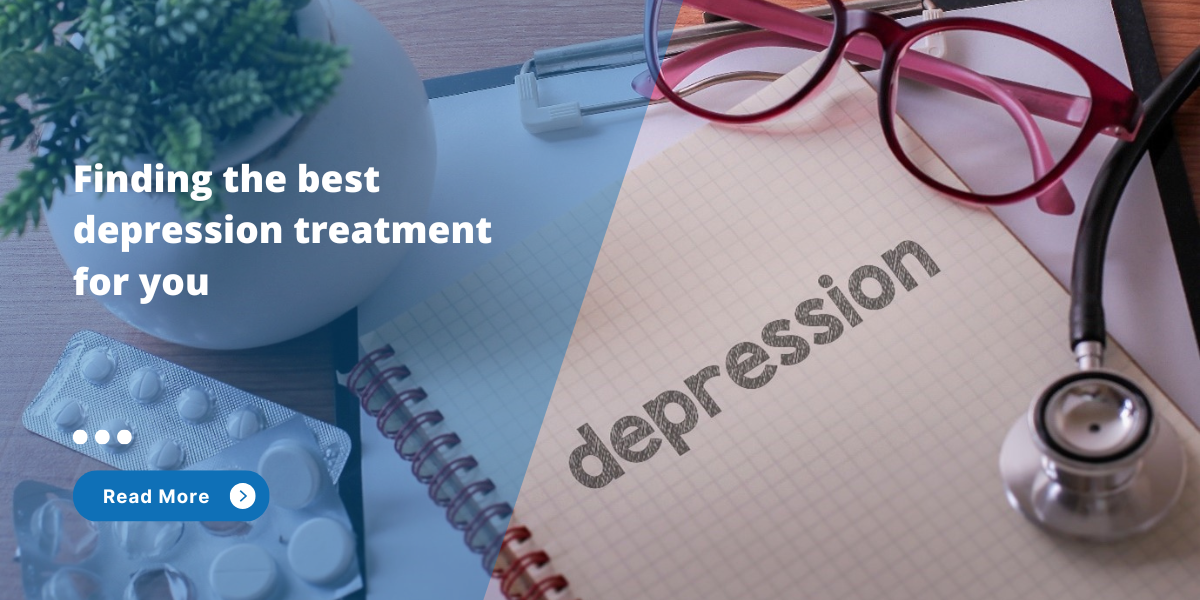How Telehealth is Revolutionizing Autism Care in New Jersey Telehealth medicine is quickly becoming one of the best options Modern...
Continue Reading
Depression treatment, however, is more persistent and it involves long-lasting and intense symptoms that can significantly impact your mood, thoughts, and daily activities. Everyone experiences moments of sadness or feeling down, but these emotions typically fade with time.
Depression (also called major depression, major depressive disorder, or clinical depression) can affect anyone, regardless of age, gender, race, income, culture, or education. Research indicates that a combination of genetic, biological, environmental, and psychological factors contributes to the development of this condition.
Did you know that there are several different types of depression?
Women shouldn’t be dismissed and ignored – additional types of depression can happen to women:

Our therapists practice Cognitive Behavioral Therapy (CBT), Interpersonal Therapy (IPT), Behavioral Activation, Individual Problem-Solving, Counseling, Behavioral Couples Therapy, and more, including services from an Anxiety Therapist NJ.
Together we will find a method that suits you and returns colors to your life.

We get it—life is busy, and sometimes squeezing in a trip to see a therapist just isn’t practical. That’s where Depression Treatment NJ and online therapy come in. Imagine being able to chat with your therapist from your living room, or wherever you feel most at ease. It’s convenient, private, and super flexible, so you can fit therapy into your life instead of rearranging everything around it.
Are you worried about the quality of online treatments? Researchers analyzed over 60 studies and discovered that virtual therapy is just as effective as in-person sessions for many individuals dealing with anxiety, depression, and post-traumatic stress disorder (PTSD). Plus, online therapy opens up more options, allowing you to find the therapist who’s the perfect match, even if they’re not in your area. Our online therapists, counselors, and coaches speak English, Russian, Ukrainian, and French.
At Advanced Psychology Institute, we offer secure, confidential online therapies that deliver the same level of care and support as face-to-face meetings. We’re committed to making sure you get the help you need.
Are you from an immigrant background? Some of our therapists at Advanced Psychology Institute are especially passionate about working with individuals who have had to build or rebuild their lives from the ground up. They draw from their experiences moving from the post-Soviet space to understand the unique challenges and strengths required to move forward, offering empathy, guidance, and support.
Do you have a family? One of our therapists specializes in working with parents with the challenges of raising kids and teens, especially those grappling with mental health issues, educational difficulties, communication hurdles, or adapting to new cultural environments.
Do you struggle with sleep, food, exercise, changing daily habits, or even career management? Our coach Alex Shinkarovsky can guide you to adopt a 1% better daily mindset.
To learn more about our therapists and Breaking the Silence: Confronting Stigma to Seek Help for Mental Health and Addiction, visit our website! You’ll find profiles of six professionals, each with a unique approach and specialties. Take your time browsing and pick the one you feel the most connected to. Therapy is good when you find a good therapist for yourself.
Find your ideal therapy partner in our carefully selected group of therapists.
How Telehealth is Revolutionizing Autism Care in New Jersey Telehealth medicine is quickly becoming one of the best options Modern...
Continue ReadingUnderstanding and Managing Emotions with Message-Centered Therapy Emotions are the brain’s way of analyzing our social environment, and they have...
Continue Reading5 Benefits of Online Depression Therapy While both in-person and online counseling can be very effective for relationship counseling, depression,...
Continue ReadingRequest an Appointment
(201) 497-0289

Stay Connected
and inspired
Subscribe for our newsletter for expert insights and mental health tips

Copyright © 2024 | All Rights Reserved | Created By Invisio Solutions Ltd